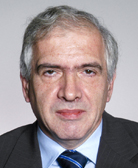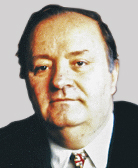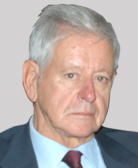
Željko Rohatinski was born on 3 August 1951 in Zagreb. In 1974 he graduated from the Faculty of Economics and Business in Zagreb and earned his doctor’s degree from the same institution in 1988 for his thesis “Role, Goals and Methods of Economic Policy and the Maturity Problem”. He started working at the Republic Institute for Social Planning in 1974 and became the Institute’s General Director in 1989. A year later, he was appointed Head of the Department for Macroeconomic Analysis and Policy of the Institute of Economics in Zagreb, which he headed until 1998, when he became Chief Economist at Privredna banka Zagreb. In April 2000, he took up the position of Director of Macroeconomic Analysis at the Agrokor concern, which he held for several months. On 12 July 2000, the Croatian Parliament appointed Mr Rohatinski Governor of the CNB, and in July 2006, he was reappointed as central bank Governor. He was Governor with the longest term of office at Croatia’s central bank, having held it from July 2000 to July 2012. He received several awards for his work – in 2009 The Banker named him the best European governor, and in 2008 the same monthly proclaimed him the best central banker on a global scale. He is the author of many professional and scientific books and articles. In 2017, Palgrave Macmillan, one of the world’s leading academic book publishing companies, published his book “Time and Economics: The Concept of Functional Time". The publication of his book “Kriza u Hrvatskoj” (Crisis in Croatia) in April 2019 was followed by the publication of his autobiography “Persona non grata” in November. He died on 12 December 2019 in Zagreb.

Marko Škreb was born on 8 May 1957 in Zagreb. He started his professional career as Assistant and later Associate Professor at the Faculty of Economics and Business of the University of Zagreb. He left his academic career to join the Croatian National Bank, first as Director of the Research and Statistics Area, and later as the Governor of the CNB, from 1996 to 2000. In 1997, he won The Banker’s Central European Annual Award for Excellence and Best Central Bank Governor. From 2000, he held the post of Advisor to the International Monetary Fund and the World Bank in many countries, mainly in Southeast Europe. He was also involved in the work of the IMF’s Independent Evaluation Office in Washington from 2004 to 2005. Following a brief career as Chief Economist at Privredna banka Zagreb, he again took position with the IMF as Advisor for monetary systems, this time in the regional centre in Accra, Ghana. Continuing his cooperation with the IMF, he spent two years working in the Ukrainian central bank. He published many articles and edited many books, most of which deal with transition topics with a focus on financial issues. He actively participated in many conferences. In 2000 he delivered the Jacques de Larosière Lecture at the EBRD annual meeting and in 2018 he delivered the annual Ante Čičin-Šain lecture. He is currently working on the FINRA project financed by USAID in Bosnia and Herzegovina and his focus is on the reform of the central bank of Bosnia and Herzegovina.

Pero Jurković was born on 4 June 1936 in Brštanica in Bosnia and Herzegovina. He graduated from the Faculty of Economics in Sarajevo in 1960 and took his doctor's degree from the University of Zagreb in 1976. Jurković held various posts, from Director of the Institute of Economics in Mostar (1963 – 1967), Senior Research Associate in the same institution, to Assistant Professor and Associate Professor at the Faculty of Foreign Trade and faculties of economics in Zagreb and Mostar (1967 – 1980). From 1980 he was a Full Professor of public and business finances of the Faculty of Economics and Business of the University of Zagreb. Jurković served as Governor of the Croatian National Bank since his appointment in 1992 until 1996 when he was appointed Chief Advisor to the Governor, the post he held until mid-May 1997. It was during his governorship that the Croatian kuna was introduced as the official currency of the Republic of Croatia in 1994. He was appointed Chief Advisor to the President of the Republic of Croatia for economy, the function he performed from 1997 to 2000. He is the founder of the Croatian Institute for Banking and Insurance and the first Director of that Institute (1997 – 2000) and he was also a Member of the CNB Council (1996 – 2000). Jurković was also a Member of the Board of Directors of Leksikografski zavod “Miroslav Krleža” and the Council for Strategic Decisions, an advisory body to the President of the Republic of Croatia. He was a Member of the International Institute of Public Finance in Saarbrücken and a Visiting Professor at universities of Rotterdam, London and Lexington. He is a recipient of many awards, including the award “B. Adžija” and “Mijo Mirković”. He is the author of over 300 scientific and professional papers and a recipient of many state decorations. He died on 18 January 2011 in Zagreb.

Ante Čičin-Šain was born in Split on 29 September 1935. He earned a master’s degree and a doctor's degree in economy from Heidelberg University, Germany, one of the best European universities. From 1961 to 1963 Čičin-Šain worked as an Assistant in the Albert Weber Institute. In parallel with his studies, he worked for the United Nations Economic Commission for Europe and participated in scientific projects at Heidelberg University. He defended his dissertation “Effect of Economic Integration on a Third Country” in 1963. From 1964 to 1972, Čičin-Šain worked as a Research Associate and Head of the Department for International Economy of the Institute of Economics Zagreb and from 1972 to 1974 he held the post of Associate Professor and Head of the Department for International Economy at what later became Faculty of Foreign Trade Zagreb. He worked in the National Bank of Croatia for several months in 1973 as a Senior Advisor for foreign exchange operations and towards the end of 1974 he again joined the National Bank of Croatia, again in the capacity of Senior Advisor. For a while he held the position of the Director of the Analysis Department, followed by the appointment to the position of Senior Advisor in the Cabinet of the Governor, where he stayed until 1982. In August 1990 Čičin-Šain was appointed the first Governor of the Croatian National Bank and he was the Governor that led the then young state on the path to monetary independence. He left the CNB in 1992 and went into diplomacy. He was the first Head of the Mission of the Republic of Croatia to the European Community in Bruxelles after which he was appointed Ambassador, first in the UK and then in Ireland. He published many papers in the field of the theory and politics of international economic relations, finance and banking. Although officially retired since 2001, he remained active on many projects. He died on 30 December 2008 in Zagreb.
